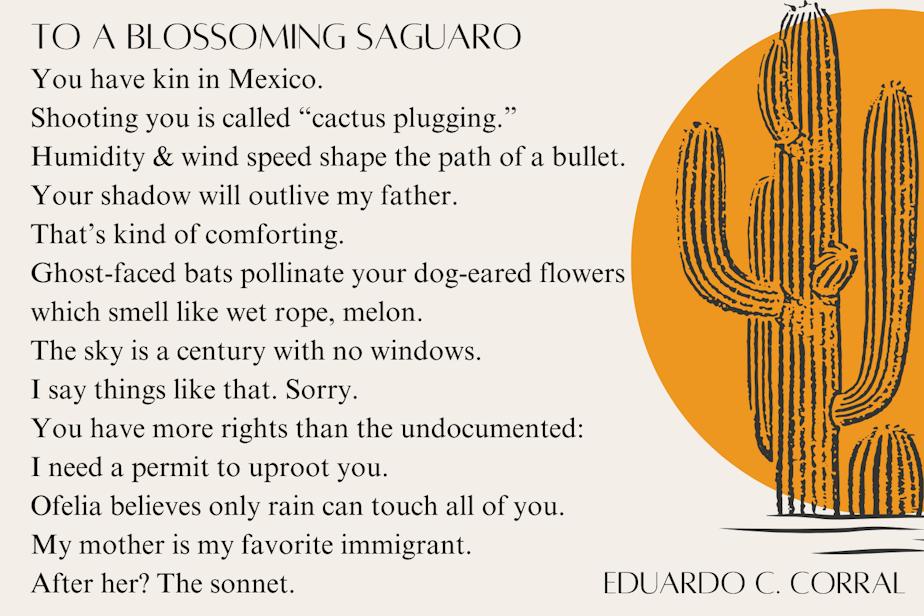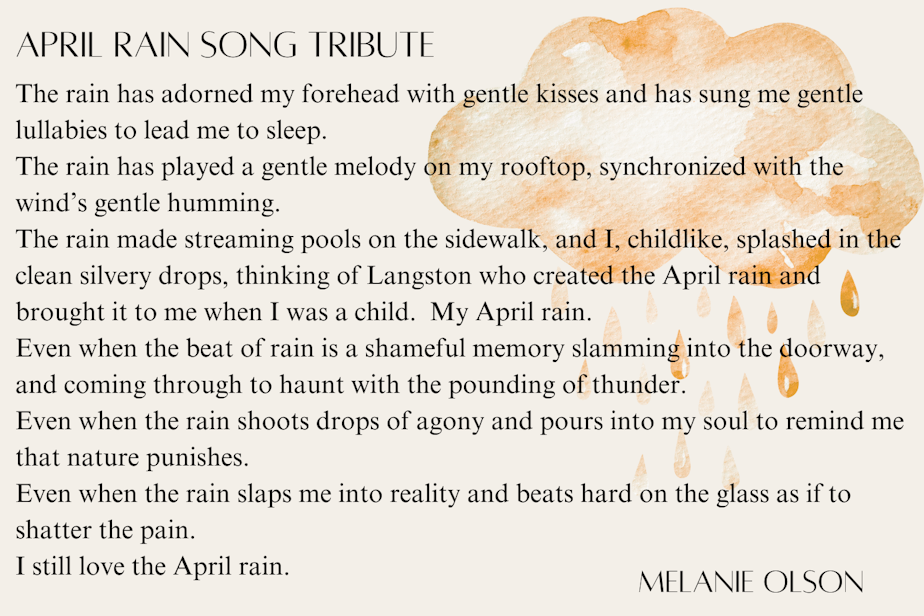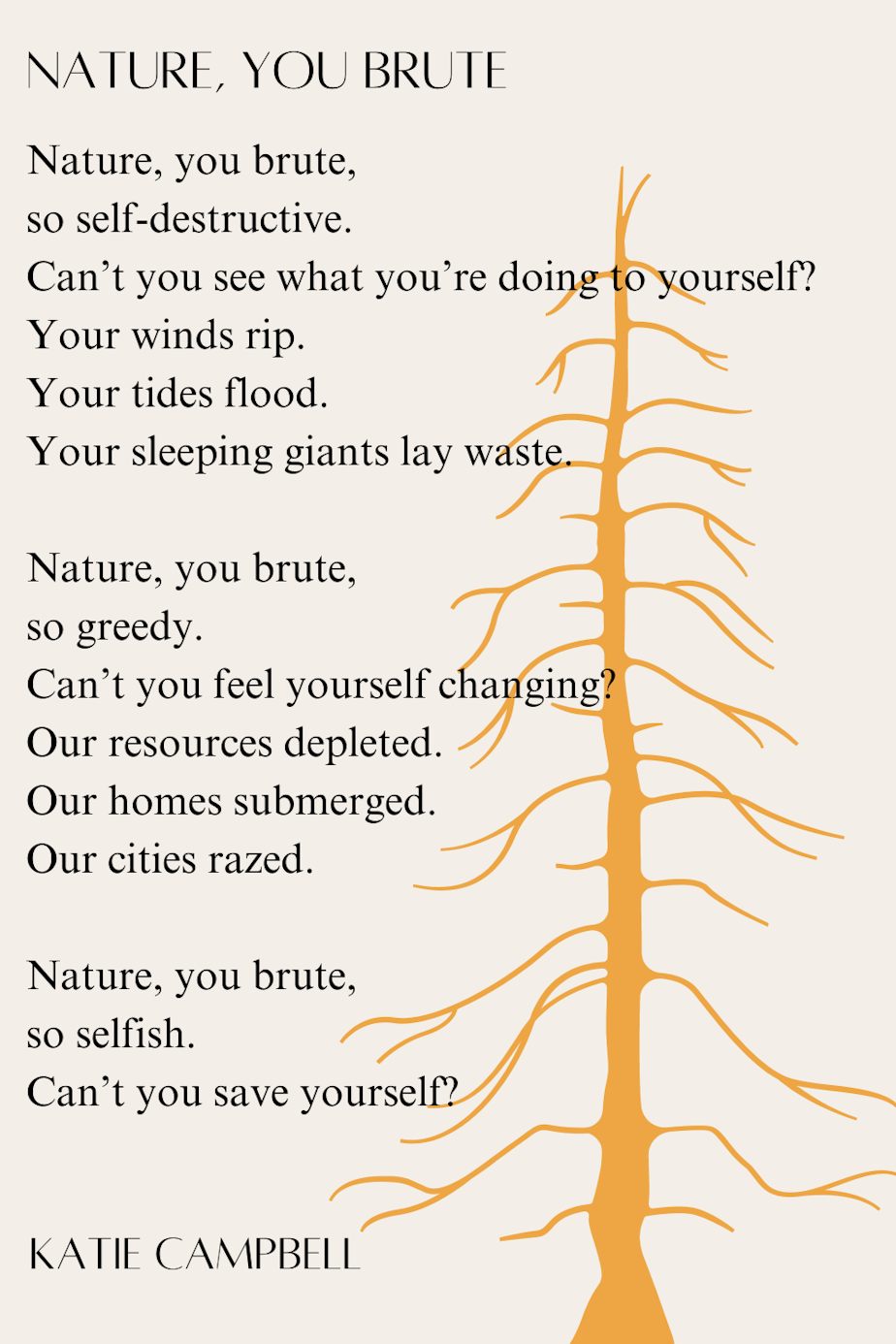'You Are Here' and you are writing. Readers get creative for National Poetry Month

This is the KUOW Book Club, and we're reading "You Are Here: Poetry in the Natural World" edited by 24th U.S. Poet Laureate Ada Limón. I'm your guide, Katie Campbell. I asked y'all to try writing a poem of your own — you delivered.
B
ook clubs are a place to build community, to engage with your fellow readers.
RELATED: Subscribe to the KUOW Book Club newsletter here
We haven't had many opportunities to get together and hear from each other — as I've told some of you, readers, I'm working on a few ideas to fix that. So, when I challenged you to try writing a poem of your own this month, in honor of "You Are Here," I hoped the results would help bring us closer together — in spirit if not in space.
I've been thoroughly impressed by the results.
"You Are Here," as you know if you are reading with the group and the many Seattle Reads participants, is all about our connection to the natural world around us. There are efforts to grapple with climate change, reflections by Native stewards, and even a ode to a blossoming cactus, tinged with societal critique.
RELATED: Seattle Reads + KUOW Book Club: Celebrating National Poetry Month with local voices
The latter is "To a Blossoming Saguaro" by Eduardo C. Corral, the son of Mexican immigrants. The poem caught my breath, and I listened to it at least a dozen times. Speaking of listening, I highly recommend checking out the audiobook version of this collection.

Before I came to Seattle, I lived for five years in Arizona, where the saguaro cactus is protected. It's illegal to damage, destroy, or remove them without a permit, though that doesn't stop people. Unfortunately, I saw many a bullet-wound-laden saguaro in the desert parks of Phoenix and surrounding areas. But that's beside the point Corral makes here: "You have more rights than the undocumented: I need a permit to uproot you."
The way Corral both honors the natural sacredness of the saguaro, mammoths of the Sonoran Desert and no other landscape in the world, while criticizing the law is masterful. It's not about whether you or I agree with him or not — it simply is.
That's what is so powerful about this poetry anthology and the individual voices within. Each poem seems to hold space for the reader's perspective, challenging that perspective, yes, but also acknowledging that you are here, too, and maybe looking for the words to express what that means.
I heard from a few of you who took a shot at putting those words to (digital) paper. I want to share a couple of my favorites before I share my own.
First, we have "The Winds of La Paz" by Richard Wallace.

Richard's words are so evocative here, from sensual to the nebulous — "The wind of cold memory," indeed. The poem seems to speak to a time and place for Richard but invites the reader to take themselves to their own space, to feel the winds of La Paz in their own special way.
Richard's poem made me think, too, of the unique ways each poem in "You Are Here" captured the sense of being in nature but also apart from it. How nature seeps into all things.
Ada Limón tasked the poets she reached out to for this anthology with calling attention to the ways of nature.
"When you recognize where you are — that you are on a planet, that you are in an ecosystem — you recognize that there is no way that you're alone," she said in an interview with NPR in 2023. "You are part of something more vibrant."
More vibrant and more complex than any one person can be.
In her submission, dedicated KUOW Book Club member Melanie Olson takes us back to a place in time, too. It's known only to her, though, as she gives us readers the barest peek into her world. But there's an invitation there, to smell the rain and feel it on your skin as you read.
In that way, Melanie speaks to something ever present, something we take for granted in a place like Seattle — the rain — and bestow upon it a kind of longing, a moment that flutters by and leaves only a trace of itself in the tiny tidal waves it makes in the puddle at our feet.

Since I'm, apparently, feeling inclined to wax poetic, I guess there's no more sense in delaying the inevitable: sharing the poem I wrote for our little assignment.
I'm lucky, because I was contemplating what I might write while I was on my annual camping trip with a couple of friends. We walked through the lush woods of Seaquest State Park, which we were pleasantly surprised to learn was just about 40 minutes away from Mount St. Helens, looming in the near distance. Somehow, none of us had been, and so, we took a day trip to the edges of the blast zone.
Standing among rocks that had been flung away from the mountain, as if in disgust, I was struck by the beauty and the violence surrounding us in the Pacific Northwest. I tried to capture that sense in my poem, "Nature, You Brute."

I wanted to evoke a sense of that natural violence — of storms and floods and earthquakes and volcanoes — and stand it up against the effects humans have on the world. It's a tough-in-cheek critique of Mother Nature, as if to say, "You asked for this."
I wanted to think about the power of the natural world, yet its powerlessness to keep up with the demands we humans put upon it.
Y'all with have to let me know if I succeeded.
And you'll have your chance if you come out to the Seattle Central Library on April 24.
Seattle-area Poets Da' and Cedar Sigo will join me to talk about their contributions to "You Are Here," the collection, and what it means to them to reflect on the world around us through poetry.
Our conversation will be free to attend, so I hope to see you all there. Don't forget to bring your poems to share with the audience.
RELATED: KUOW Book Club's April pick: A poetry anthology exploring our connection to nature
----------------------------------------------------------------------------------------
Spoiler alert: For those of you who like to plan ahead, our May pick is "The Return of Ellie Black" by Emiko Jean. Jean has kindly agreed to an interview at the end of May to cap off our reading!
Detective Chelsey Calhoun’s sister vanished when they were teenagers, and ever since she’s been searching: for signs, for closure, for other missing girls. Then, her life is turned upside down when local teenager Ellie Black is found alive in the woods of Washington state — two years after she disappeared without a trace.
"The Return of Ellie Black" made the 2024 NPR "Books We Love" list, which I'd say bodes well for us readers — but maybe not so well for the characters at Jean's mercy.
RELATED: NPR's 'Books We Love' returns. 5 books for your Pacific Northwest reading list




